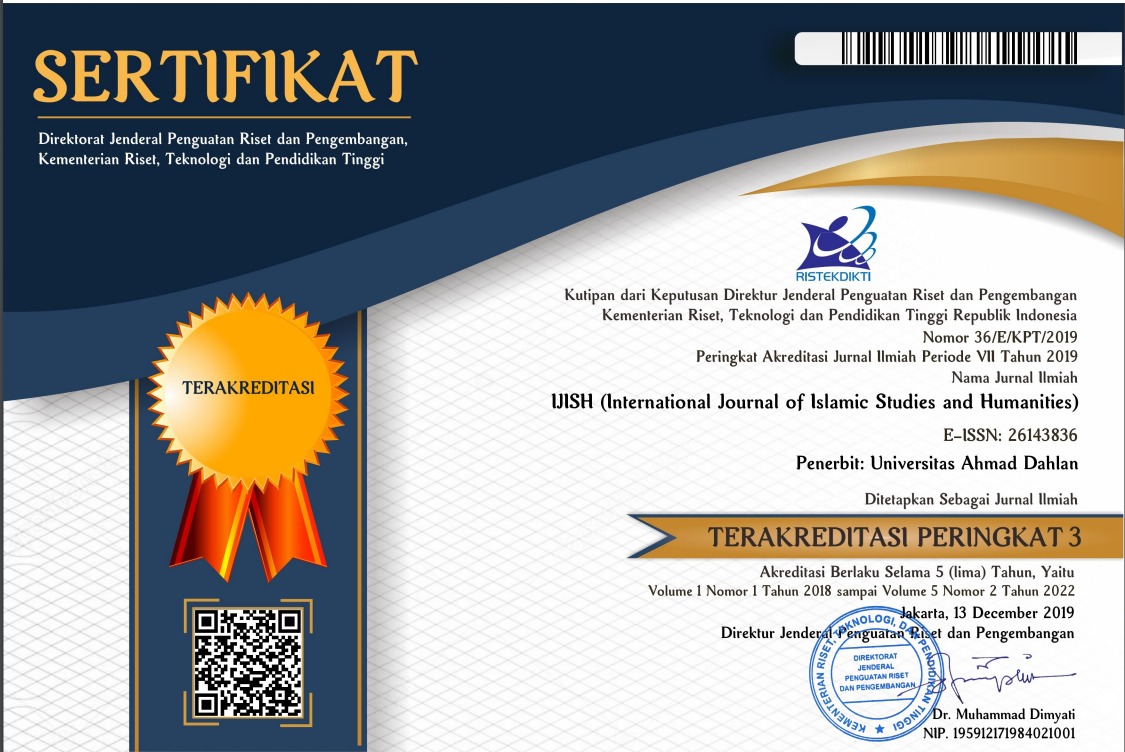Ways for Peaceful Society in Islamic Law
DOI:
https://doi.org/10.26555/ijish.v3i1.1913Keywords:
Islam, Qur'an, Hadits, Virtues, Peace, Society, ProsperityAbstract
Every individual is the first unit of the society. Family becomes by living the individuals together and then society becomes by the different family groups. The family happiness and prosperity is based on the individual while the society happiness and prosperity lies on the groups of family. Although the establishment of a peaceful society is essential for the prosperity of the country. It is a universal fact that no country can develop until and unless the existence of peace in any field. Peace is the foremost priority in the development of the country. That is why in the modern world, those countries that are in the race for development, in fact there is peace. Peace is the only way that can lead the people to a successful life, and this is the philosophy that Allah revealed to His Prophet Mohammed fourteen hundred years ago in the last book of the Holy Qurâ”’n. Allah says. Translation: And (I grant a) peace in fear. Islam is a peaceful religion, its best examples, we can see, in the practical life of Holy Prophet (SAW). He was the Messenger of Allah (SWT) to convey the message of honesty, piousness, peace, mercy, integrity, and love. He had never done any activity which indicate act of terrorizing, misconduct, racism and violation against humanity. This study was aimed to analyze the basic and essential virtues of Islam for establishment of peaceful society in Islamic Law.Downloads
Published
2020-04-26
How to Cite
Qadoos, A., & ŞİMÅžEK, M. (2020). Ways for Peaceful Society in Islamic Law. IJISH (International Journal of Islamic Studies and Humanities), 3(1), 32–37. https://doi.org/10.26555/ijish.v3i1.1913
Issue
Section
Articles
License
Authors who publish with IJISH (International Journal of Islamic Studies and Humanities) agree to the following terms:
- Authors retain copyright and grant the journal right of first publication with the work simultaneously licensed under a Creative Commons Attribution License (CC BY-SA 4.0) that allows others to share the work with an acknowledgment of the work's authorship and initial publication in this journal.Â
- Authors are able to enter into separate, additional contractual arrangements for the non-exclusive distribution of the journal's published version of the work (e.g., post it to an institutional repository or publish it in a book), with an acknowledgment of its initial publication in this journal.
- Authors are permitted and encouraged to post their work online (e.g., in institutional repositories or on their website) prior to and during the submission process, as it can lead to productive exchanges, as well as earlier and greater citation of published work.

This work is licensed under a Creative Commons Attribution-ShareAlike 4.0 International License.






